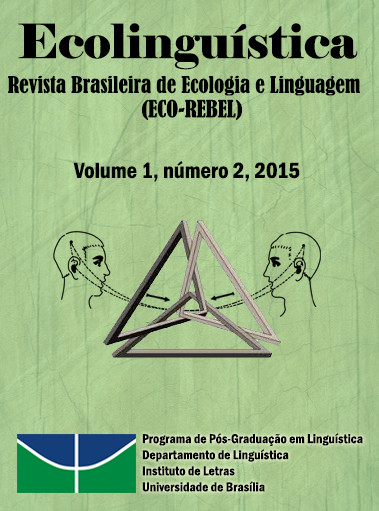Diversidade, contato e ecologia linguística: Uma aproximação a apartir da complexidade sociocognitiva
Keywords:
Language contatc; Ecology; Language ecology; Diversity; Multidimensionality.Abstract
The ecological perspective in language studies has been shown to be highly productive, above all in the when diversity and language contact is concerned. It implies a theoretical and conceptual widening of the social awareness concerning preservation, acceptation and normalization of linguistic diversity among humans. In this article I will discuss the multidimensional aspects of language contact ”“ after the presentation of the ecological perspective in linguistics ”“, including the sociocognitive viewpoint, dynamicity and processuality. All this in an integrative framework for language studies, leading to ‘language diversity’.
References
BARRETO, A. Nationalism and linguistic security in contemporary Puerto Rico. Canadian Review of Studies in Nationalism, XXII, 1-2, 1995, p. 67-74.
BASTARDAS BOADA, A. Ecologia de les llengües. Medi, contactes i dinà mica sociolingüística. Barcelona: Proa/Enciclopèdia Catalana, 1996.
_______. Lingüística General y teorías de la complejidad ecológica: algunas ideas desde una transdisciplinariedad sugerente. Lingüística para el siglo XXI. Salamanca: Publ. Universidade de Salamanca, 1999, p. 287-294.
_______. Política lingüística mundial a l’era de la globalització: diversitat i intercomunicació des de la perspectiva de la ‘complexitat. Noves SL. Revista de sociolingüística. Disponível em: http://www6.gencat.net/llengcat/noves/, 2002a. (Há tradução ao castelhano: "Política mundial del lenguaje en la era de la globalización: diversidad e intercomunicación desde la perspectiva de la complejidad”. Dimensión antropológica 28, 2003, p. 15-41.
_______. The Ecological perspective: Benefits and risks for Sociolinguistics and Language Policy and Planning”. In: Fill, Alwin; Penz, Hermine; Trampe, Wilhelm (orgs.). Colourful Green Ideas. Berna: Peter Lang, 2002b, p. 77-88.
_______. Ecodinámica sociolingüística: comparaciones y analogías entre la diversidad lingüística y la diversidad biológica", Revista de llengua i dret 39, 2003a, p. 119-148.
_______. Lingüística general: elementos para un paradigma integrador desde la perspectiva de complejidad. Lingüística en la Red, n. I. Disponível em: /www.linred.com, 2003b, p. 1-23.
_______. Sociolinguistics: Towards a Complex Ecological View. In: Massip-Bonet, A.; Bastardas-Boada, A. (orgs.). Complexity perspectives on language, communication and society. Berlim: Springer, 2013, p. 15-34.
_______; BOIX, E. (orgs.) ¿Un estado, una lengua? La organización política de la diversidad lingüística. Barcelona: Octaedro, 1994.
BATESON, G. Steps to an ecology of mind. New York: Ballantine Books, 1972.
CAPRA, F. The Turning Point. New York: Simon and Schuster, 1982.
_______. La trama de la vida. Barcelona: Anagrama, 1998.
BOHM, D. La totalidad y el orden implicado. Barcelona: Kairós, 1987.
COMELLAS CASANOVA, P. Ecologia lingüística. Treballs de sociolingüística catalana 21, 2011, p. 65-72.
ELIAS, N. La sociedad de los individuos. Barcelona: Ed. Península, 1990.
_______. The symbol theory. London: SAGE Publications, 1991.
FILL, A.; MÜHLHÄUSLER, P. (orgs.). The Ecolinguistics Reader: A Selection of Articles on Language, Ecology and Environment. Londres/NovaYork: Continuum, 2001.
FOLCH, R. Una conversa amb Ramon Folch” (entrevista a L. Reales) , Idees. Revista de temes contemporanis 2, 1999. Disponível em: http://www.idees.net/idees.
HAUGEN, E. The ecology of language", Dil, Anwar S. (ed.). The Ecology of Language. Stanford: Stanford University Press, 1972, p. 325-339.
JACOBS, J. The nature of economies. Toronto: Random House, 2000.
JUNYENT, C. Contra la planificació. Una proposta ecolingüística. Empúries, Barcelona, 1998.
MACKEY, W. F. Toward an Ecology of Language Contact. In: Mackey, W.F.; Ornstein, J. (orgs.). Sociolinguistic Studies in Language Contact. Haia: Mouton, 1979, p. 453-460.
_______. The Ecology of Language Shift. In: Nelde, P. H. (org.). Sprachkontakt und Sprachkonflikt. Wiesbaden: Franz Steiner Verlag, 1980, p. 35-41.
_______. La ecología de las sociedades plurilingües. In: Bastardas, A.; Boix, E. (orgs.). ¿Un estado, una lengua? La organización política de la diversidad lingüística. Barcelona: Octaedro, 1994, p. 25-54.
MORIN, E. La Méthode. 4. Les idées. Leur habitat, leur vie, leurs moeurs, leur organisation. Seuil, Paris, 1991.
_______. Introduction à la pensée complexe. Paris: ESF, 1992.
_______. Terre-Patrie. París: Seuil, 1993.
MUFWENE, S. The Ecology of Language Evolution. Cambridge: Cambridge University Press, 2001.
MÜHLHÄUSLER, P. Linguistic Ecology: Language Change and Linguistic Imperialism in the Pacific Rim. London: Routledge, 1996.
TERBORG, R. La ‘ecología de presiones’ en el desplazamiento de las lenguas indígenas por el español. Presentación de un modelo, Forum: Qualitative Social Research / Sozialforschung , IV, 4, 2006. Disponível em: http://www.qualitative-research.net/index.php/fqs/article/view/167/374
WORLD COMMISSION ON ENVIRONMENT AND DEVELOPMENT. Our common future. Oxford/New York: Oxford University Press, 1987.
Downloads
Published
Issue
Section
License
Authors who publish in this journal agree to the following terms:
Authors retain copyright and grant the journal the right of first publication. The work is simultaneously licensed under the Creative Commons Attribution License allowing the sharing of the work with acknowledgment of the authorship of the work and initial publication in this journal.
Authors are authorized to enter into additional contracts separately for non-exclusive distribution of the version of the work published in this journal (e.g., publishing in institutional repositories or as book chapters), with acknowledgment of authorship and initial publication in this journal.
Authors are allowed and encouraged to post and distribute their work online (e.g., in institutional repositories or on their personal page) at any point before or during the editorial process, as this can bring about productive revisions as well as increase impact.
Citation of published works (See The Effect of Free Access).



3.png)



